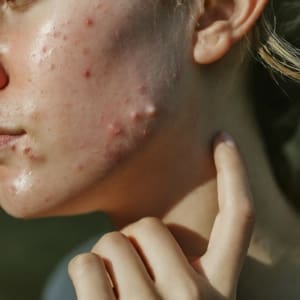When spring finally blooms, everything tends to look a little brighter. The days are longer, the temperatures are warmer, and various forms of nature emerge from winter hibernation. Spring is often welcomed by most people, but how do the seasonal changes affect your skin? How can the skin be protected throughout these changes?
Increased humidity and sun exposure, and heightened levels of allergens such as pollen, dust, and mould all contribute to various skin problems during spring. Such problems include acne, eczema, rosacea, and UV damage. There are a number of ways to treat and prevent these skin problems including limiting sun and allergen exposure, regular moisturisation and exfoliation, consuming nutrients and using face masks.
Keep reading to find out more about how spring affects your skin, and find out how you can treat some of the more common problems that arise during this season.
How do Seasonal Changes Affect the Skin?
When spring arrives, the weather is warmer and the sun shines brighter for longer. While most people welcome leaving the dreary winter months behind, seasonal changes bring with them a number of irritants for the skin. The unstable climate that spring brings with it can have as detrimental an effect on people’s skin as winter does. For example, the amount of invisible airborne allergens such as pollen, dust and mould caused by the trees and plants beginning to bud can make people’s skin highly sensitive. Combine these airborne allergens with the increased humidity and sun exposure, spring becomes the perfect environment for developing skin problems.
What are Some Common Skin Problems in Spring?
The conditions in spring can cause highly sensitive skin to trigger allergy-related itchiness and eczema. The thinner and exposed skin on the face is particularly vulnerable to flare ups or skin eruptions, especially around the eyes and cheeks. Other common skin problems include:
Acne
With the increased humidity and often an increase in the level of activity that people are engaging with, it is common for acne to flare up during spring. This is due to increased perspiration blocking the pores in the skin, causing an excess of oil to develop.

Eczema
The dust and pollen that is symptomatic of spring can also cause eczema, defined by itchy, dry and irritated skin. Eczema tends to appear on the hands, insides of the elbows or the backs of knees, and can be extremely uncomfortable.
Rosacea
With increased exposure to sun and airborne allergens, redness and inflammation of the face, known as Rosacea, is a common skin problem that flares up during spring. Skin can feel dry and rough, and may feel highly sensitive.
UV Damage
It is only normal to want to spend more time out of the house once the winter months are over. However, this also opens the door to the potential for UV damage. Our skin must be protected from harmful UV radiation, otherwise dryness, age spots, fine lines and wrinkles are likely to occur.
Can you Treat Skin Problems During Spring?
Taking into consideration the causes of the skin problems likely to occur during spring, there are a number of ways to reduce the impact of the seasonal changes. By simply reducing your exposure to the sun and other airborne allergens, you can minimise the impact of a number of skin problems. Similarly, by ensuring windows and doors are kept shut and by using air purifiers, you can also reduce the amount of dust and pollen particles your skin is exposed to. Other tips for treating skin problems include:
- Regular moisturisation – Hydrate the skin using a balanced moisturiser with sunscreen protection to help prevent the appearance of fine lines and wrinkles.
- Gentle exfoliation – Give the skin a healthy glow by removing dead skin cells to reveal a clear and smooth complexion.
- Nutrients – Consuming foods containing antioxidants and nutrients will strengthen collagen production, brighten complexion and reduce wrinkles.
- Face masks – Using face masks will help to hydrate the skin and shed old skin cells.
Rejuvenate your Skin with Infinity Aesthetics
If you are often falling victim to skin problems during the spring, Infinity Aesthetics offer a range of treatment options to keep your skin looking youthful and hydrated. Our skin rejuvenation treatment offers the optimal solution for dry or tired-looking skin. Book an appointment today, or contact us to find out more.

Dr. Owen Thomas has been a medical doctor for more than 20 years since qualifying from Cardiff in 1999, now specialising in aesthetics in London and Swansea. After a 2 year level-7 Master’s Degree course in injectable aesthetic treatments training at Harley Academy, and additional study with Empire Medical Training in the US and other experts renowned in their field, he won a scholarship in the prestigious Aesthetic Intelligence Fellowship run over 7 months in Kensington, London and Paris.










